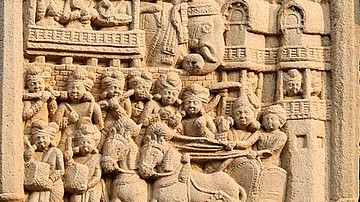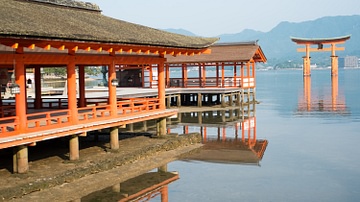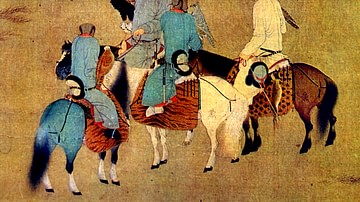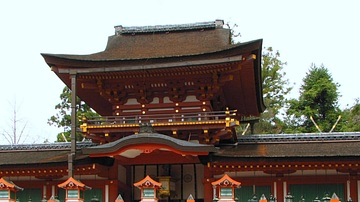Search
Did you mean: Elam?
Search Results

Definition
Ajatashatru
Ajatashatru (c. 493/492 BCE - c. 462/460 BCE) was the second important king of the Haryanka Dynasty, who came to the throne of Magadha by deposing and executing his own father Bimbisara. The Haryanka Dynasty (c. 545/544 BCE - c. 413 BCE...

Definition
Itsukushima Shrine
Itsukushima Shrine is a Shinto shrine on the island of the same name, also known as Miyajima, located in Hatsukaichi, Hiroshima Prefecture, Japan. Traditionally founded in the 6th century CE, the present layout of buildings dates to the 12th...

Definition
Ögedei Khan
Ogedei Khan (aka Ogodei) ruled the Mongol Empire from 1229 to 1241. He was the third son of Genghis Khan (r. 1206-1227), the empire's founder. Ogedei's accomplishments included creating a new capital at Karakorum, establishing a system of...

Definition
Khitan
The Khitan people formed the Liao dynasty and ruled parts of Mongolia, Manchuria, and northern China from 907 to 1125 CE. Adopting elements of Chinese government and culture, the Khitan were more than a match for their rivals the Song dynasty...

Definition
Mamikonian Dynasty
The Mamikonians were a powerful clan group who were influential in Armenian political and military affairs from the 1st century BCE onwards. They rose to particular prominence from c. 428 CE to 652 CE in the half of Armenia ruled by the Sasanian...

Definition
Kasuga Taisha
Kasuga Taisha is an ancient Shinto shrine located in a forest east of Nara, capital of Japan between 710 and 784 CE. Founded in 768 CE, the site has four main shrines in honour of four Shinto-Buddhist deities, one of which is the ancestor...

Article
Ancient Israelite & Judean Religion
As early as the 10th century BCE, Israelite and Judean religion began to emerge within the broader West Semitic culture, otherwise known as Canaanite culture. Between the 10th century and 7th centuries BCE, ancient Israelite and Judean religion...

Article
Ancestor Worship in Ancient China
Ancestor worship in ancient China dates back to the Neolithic period, and it would prove to be the most popular and enduring Chinese religious practice, lasting well into modern times. The family was always an important concept in Chinese...

Article
Japanese Castles
Fortifications of one kind or another had been used in Japan since ancient times, but in the period from 1576 until 1639, a new and distinctive style of castle was constructed. Rather than being used for fighting, these were impressive structures...

Article
A Seminole Creation Story & Other Tales
The Seminole are a Native American nation of people descended from the Muscogee Creek nation, and others, who migrated to the modern-day State of Florida in the 1700s fleeing wars in the north. They were later joined by runaway slaves known...